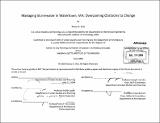Managing stormwater in Watertown, MA : overcoming obstacles to change
Author(s)
Chai, Shutsu K. (Shutsu Kindness)
DownloadFull printable version (46.46Mb)
Other Contributors
Massachusetts Institute of Technology. Dept. of Architecture.
Advisor
Judith Layzer and John E. Fernandez.
Terms of use
Metadata
Show full item recordAbstract
As effective imperviousness increases with urbanization, the impacts of stormwater runoff on local water systems and aquatic life are more and more deleterious. Stormwater runoff carries pollutants into nearby water bodies, alters stream banks, reduces stream base flows and bypasses infiltration processes that both clean and recharge groundwater. While these consequences are still invisible to the average citizen, human life is wholly dependent on adequate quantity and quality of water resources, which polluted stormwater runoff threatens. This link has motivated more widespread attention to and effort in stormwater management, yielding new technologies, initiatives and solutions. As this new paradigm for stormwater management grows better established and more broadly accepted, the struggles to minimize the impact of runoff have shifted from the technology to implementation. A deeper understanding of the challenges and barriers to the adoption of new best management practices will allow us to better target efforts to overcome those obstacles. Conducting a case study of Watertown, MA, I interviewed local officials, planners and activists. Through these conversations, I identified four primary barriers: funding shortages, disagreement over implementation mechanisms, knowledge limitations and site constraints. Despite these limitations, educational programs, codified local regulations coupled with design guidelines and a flexible local funding source can help localities surmount those hurdles.
Description
Thesis (M.C.P.)--Massachusetts Institute of Technology, Dept. of Urban Studies and Planning, 2009. Includes bibliographical references (p. 65-68).
Date issued
2009Department
Massachusetts Institute of Technology. Department of Urban Studies and PlanningPublisher
Massachusetts Institute of Technology
Keywords
Urban Studies and Planning., Architecture.